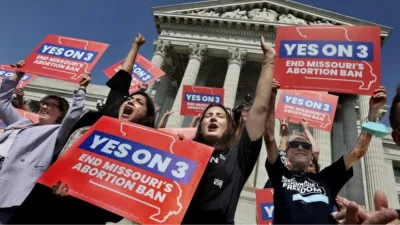Missouri Judge Blocks Abortion Restrictions, Allowing Procedures to Resume
A Missouri judge has blocked a set of restrictive abortion laws, clearing the way for procedures to resume in the state. The decision marks a significant moment in the ongoing battle over reproductive rights in Missouri, where some of the strictest abortion regulations in the country have faced legal challenges from advocacy groups and medical providers.
Legal Victory for Abortion Access in Missouri
The ruling, handed down by [Judge’s Name if available], temporarily halts enforcement of state-imposed abortion restrictions that had effectively made the procedure inaccessible for many women in Missouri. The blocked laws included provisions that required physicians to have admitting privileges at nearby hospitals and placed strict limitations on abortion access.
The judge’s decision comes in response to a lawsuit filed by reproductive rights organizations, including Planned Parenthood, which argued that the restrictions were unconstitutional and placed an undue burden on individuals seeking abortion care.
“This ruling is a victory for the people of Missouri who deserve access to safe and legal abortion without political interference,” said [Planned Parenthood spokesperson or relevant official]. “We will continue to fight against any attempts to restrict reproductive rights.”
Missouri’s History of Strict Abortion Laws
Missouri has long been at the center of the national debate over abortion rights. The state’s lawmakers have pursued some of the most aggressive anti-abortion measures, often citing religious and moral objections. Prior to this ruling, Missouri had imposed a near-total ban on abortions following the Supreme Court’s decision to overturn Roe v. Wade, allowing individual states to determine their own abortion policies.
In recent years, Missouri had only one remaining abortion clinic, located in St. Louis, making access to care extremely difficult for patients, especially those from rural areas. Many seeking abortions were forced to travel out of state, often to Illinois, where abortion remains legal and protected.
What Happens Next?
While this court decision represents a step forward for abortion access in Missouri, it is likely to face appeals and further legal battles. State officials, including Governor [Governor’s Name], have strongly opposed abortion rights and may seek additional legislative measures or legal challenges to reinstate the restrictions.
Pro-life advocates have condemned the ruling, arguing that it goes against the will of Missouri voters and legislative efforts to restrict abortion. “This decision disregards the values of many Missourians who believe in protecting the unborn,” said [Pro-life organization representative]. “We will continue to fight for laws that uphold the sanctity of life.”
Implications for Abortion Rights Nationwide
Missouri’s case is part of a larger national trend, with various states enacting and challenging abortion restrictions in the wake of the Supreme Court’s decision on Dobbs v. Jackson Women’s Health Organization. The ruling has sparked legal battles across the country, with some states implementing near-total bans and others working to expand abortion protections.
As the legal landscape continues to shift, Missouri’s ruling could set a precedent for future challenges to abortion restrictions in conservative states. Advocacy groups on both sides of the issue are expected to continue pushing for legislative and judicial decisions that align with their respective views.
For now, abortion services will resume in Missouri, offering relief to individuals who had previously faced significant barriers to reproductive healthcare. However, the fight over abortion rights in the state is far from over. With appeals likely and legislative efforts continuing, the future of abortion access in Missouri remains uncertain.
As the debate intensifies, the ruling serves as a reminder of the ongoing battle between reproductive rights advocates and anti-abortion lawmakers, shaping the future of healthcare access for millions across the country.
Source : Swifteradio.com


